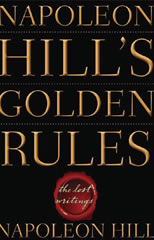
Author : Hill Napoleon
Title : Golden rules
Year : 2009
Link download : Hill_Napoleon_-_Golden_rules.zip
Foreword. Perhaps you are like millions the world over who have read Napoleon Hill’s writings and have profited from them. Whether you are a follower of Hill’s teaching or this is your first encounter with his writing, you will benefit from these lessons on human potential. The sources of the book you have in your hands are magazines Hill published over eighty years ago. Hill’s Golden Rule Magazine and Hill’s Magazine were published for several years before his first book appeared. Hill’s lessons are a series of writings on human potential. The remote mountains of Wise County, Virginia, where Hill was born in 1883, did not provide a lot of opportunities for a boy being raised in poverty. Hill’s mother died when he was ten years old, and his father married again a year later. Napoleon’s new stepmother was to be a blessing to the young boy. Martha was a young widow who was educated, the daughter of a doctor; she took a liking to her highly energized stepson, who was often involved in mischievous deeds. The newest member of the Hill household was a source of encouragement that lasted a lifetime. Later in life, Hill credited his stepmother in a manner similar to the way Abraham Lincoln, the sixteenth President of the United States, credited his, when he once remarked that ‘‘whatever I am or ever aspire to be I owe to that dear woman.’’ By the age of thirteen, with the help of his stepmother, he had traded a pistol for a typewriter. A series of articles would encourage his pursuit of a profession in writing. After two years of high school, Hill enrolled in a business school, and upon completion sought a job with Rufus Ayres, who had been Attorney General of the State of Virginia, an officer in the Confederacy, and at one time a candidate for the United States Senate. General Ayres was into banking, lumber, and coal mining, and Hill thought of him as the richest man in the mountains. Suddenly attracted to the law profession, however, Hill convinced his brother Vivian to apply with him to Georgetown Law School; Napoleon would work as a writer and pay both of their ways. Both enrolled at Georgetown Law School, and Vivian graduated but Napoleon was detoured, obtaining a job with Bob Taylor’s Magazine, which was owned by Robert Taylor, a United States Senator from Tennessee. Hill’s assignments were success stories, including a story on the growth of Mobile, Alabama, as a seaport. When he was sent to interview Andrew Carnegie at his 45-room mansion, what was scheduled to be a short interview lasted three days. Carnegie challenged him to interview the successful and develop a philosophy of success, which Hill would then teach to others. Hill’s life was changed drastically, and his lifelong adventure was to interview successful people in his study of why some were successful and so many others were not. Carnegie’s introduction put the young Hill in contact with Henry Ford, Thomas Edison, George Eastman, John D. Rockefeller, and other noted people of the time. Hill’s study of the success principles took twenty years with over five hundred interviews before he wrote his first book. Hill lived to be 87 years old and during his lifetime developed the philosophy of success principles that are as relevant today as when he studied and recorded his findings in his books. Hill’s first title was actually an eight-volume set called The Law of Success, published in 1928. He began to receive royalties of $2,000 to $3,000 per month, such a huge sum that he purchased a Rolls-Royce for a visit up Guest River in the mountains of Wise County, Virginia, where he had spent his childhood. Hill wrote a small book called The Magic Ladder to Success, and while it appeared to be a condensed version of The Law of Success, it added a section called ‘‘Forty Unique Ideas’’ for making money. Among Hill’s ideas were automatic gas filling stations at which motorists could serve themselves either day or night, keyless locks to prevent theft, and fountain drinks made of vegetables served fresh without preservatives. Remember, this was in 1930; the list demonstrates what a visionary Hill was. Further evidence that Hill was a visionary is found in the fact that so much of the self-help material written today is simply a version of what Hill studied and wrote about over 80 years ago. Today a number of books have been written about the law of attraction as if it is some newly discovered principle that will ensure success. Hill wrote about this ‘‘new’’ principle in the March 1919 issue of Hill’s Golden Rule Magazine, which is included in Lesson #4: The Law of Retaliation. Today there are stacks and stacks of books that reference one or more of Hill’s works, and he is no doubt quoted more than any other motivational writer or speaker who ever lived. These quotes are sometimes used verbatim and at other times with slight changes. In 1937, Hill wrote his most famous book, Think and Grow Rich, which sold out three times the year it was published at $2.50 a copy in the middle of the Great Depression, and that was without mass advertising that exists today. Think and Grow Rich has sold over sixty million copies worldwide and still sells about one million copies per year. Today a best seller is usually classified as a book that sells a hundred thousand copies. All of Hill’s books have sold more than that, and most exceed a million copies. The more popular books today have what publishers refer to as a shelf life of one to two years (the length of time the book is in demand and remains in stock at major bookstores). Hill’s The Law of Success has been in continuous publication since 1928, Think and Grow Rich since 1937, Master Key to Riches since 1945, Success Through a Positive Mental Attitude since 1960, Grow Rich with Peace of Mind since 1967, and You Can Work Your Own Miracles since 1971. In other words, Hill’s books sell better today than when he first wrote them. Don M. Green Executive Director The Napoleon Hill Foundation. ...

Demolins Edmond - L'éducation nouvelle
Auteur : Demolins Edmond Ouvrage : L'éducation nouvelle Année : 1898 Lien de téléchargement :...














